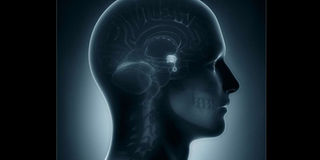SEXUAL HEALTH: It’s no laughing matter

A growth in the pituitary gland, a small gland in the brain that controls production of testosterone, may lead to low levels of the hormone. PHOTO| FILE |NATION MEDIA GROUP
What you need to know:
- The couple had been married for nine years. Jacinta was a 37 year old high school teacher. She and John had been trying to conceive their first child for two years with no success.
- I examined John and noticed that his physique was more feminine than manly. His skin was smooth with scanty hair. He was rather sweaty.
- Testosterone levels reduce gradually from the age of 30 in a number of men but it is never so sudden as to cause such drastic symptoms as John had.
John’s protruding tummy – he looked like he was eight months pregnant – was worrying his wife Jacinta. His tummy had enlarged over four years, and Jacinta had remained quiet so as not to hurt her husband’s ego. “He has lost erections now,” she said when they came to my clinic. John nodded.
The couple had been married for nine years. Jacinta was a 37 year old high school teacher. She and John had been trying to conceive their first child for two years with no success.
“But that did not worry me much, doctor,” she explained. “I got seriously concerned when John’s erections started dwindling and then when his machine finally ceased!”
The couple had not had sex for eight months. At the age of 40, John found himself completely unable to get erections. Other than accelerated weight gain, the hair on his face and chest had been reducing and he complained of his skin getting smooth. He had also become too lazy to look after his trailer transport business.
“We seem to have a number of issues here,” I interrupted their detailed explanations. “Loss of erections, obesity, sexless marriage, inability to conceive.”
Then I asked a number of exploratory questions to better understand the couple’s problems.
PHYSIQUE MORE FEMININE THAN MANLY
Turned out that their marriage was harmonious, except that their intimacy was waning due to inability to have sex. Meanwhile, John had undergone a number of body changes; other than weight gain, loss of hair and fatigue, he was sweating a lot.
I examined John and noticed that his physique was more feminine than manly. His skin was smooth with scanty hair. He was rather sweaty. His breasts had enlarged. His genitals were normal although his testicles were slightly smaller than expected. I concluded that he was suffering a sex hormone imbalance and ordered a number of tests. I was especially worried that he could be suffering from low testosterone, a hormone that maintains male vitality including body stature, hair growth, male aggression, sex desire, sexual function and even sperm production. A hormone related inability to produce sperm could have led to the infertility in the family.
The test results were out in a week and as fate would have it, John’s testosterone was low. Another hormone, prolactin, was high. High prolactin reduces sexual function. It also leads to breast enlargement and milk production.
“So what actually causes low testosterone?” John asked.
DIAGNOSIS
Well, testosterone levels reduce gradually from the age of 30 in a number of men but it is never so sudden as to cause such drastic symptoms as John had. Obesity in itself can cause low levels of the hormone, although its deficiency also leads to obesity. Other known causes of low testosterone are alcoholism, lack of adequate sleep, stress, some medicines used to treat other medical conditions, and diseases that destroy testosterone producing cells of the testis or those that interfere with parts of the brain that regulate hormone production in the testis.
“I feel scared! I hope I don’t have brain cancer,” John interrupted.
“Actually I forget a lot nowadays and my head aches a lot and recently I have been seeing double sometimes, like seeing two Jacintas in bed when I get home late in the night!” He burst out laughing.
But this seemingly trivial joke was the best lead I ever got in diagnosing a growth in the pituitary gland, a small gland in the brain that controls production of testosterone. The gland also produces prolactin. Further tests revealed that it is this tiny gland that had a growth. Fortunately the growth was not cancerous.
John underwent surgery and had the growth removed. His hormones normalised and he regained sexual function. It has now been two years. Jacinta called me to ask where she could go for ante-natal clinic.
She had just conceived. It is her call that reawakened these memories of how a small gland in the base of the brain can wreak havoc on a successful family man like John.





